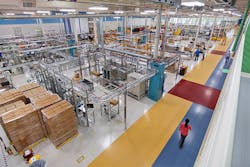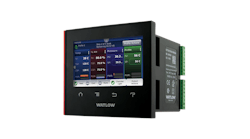"It’s time to move on," Emerson Electric Co. CEO David Farr said in a Nov. 28 conference call after Rockwell Automation’s board unanimously rejected Emerson’s acquisition proposal without any negotiation or discussion.
After three attempts at wooing Rockwell’s management and shareholders, Farr has finally given up his dream of creating an automation giant from one acquisition. Instead, the company will focus on bolt-on acquisitions.
"We see opportunities to continue to move forward and continue to build out, not only in our process business, but also in our hybrid and discrete business," Farr said.
Much speculation has occurred about why Emerson seemed so relentless in its bidding. But the acquisition would have given Emerson footing in the approximately $40 billion discrete automation market, which Rockwell excels in.
Emerson also saw a chance to build up its industrial automation unit after several divestitures over the last few years shrunk it from a $30 billion company to a $14 to 15 billion company.
"On the discrete side, Emerson has mediocre presence, which is why they wanted to acquire Rockwell, so they can have domination across the industrial spreads — process, discrete and hybrids," said Muthuraman “Ram” Ramasamy, a consulting manager at Frost & Sullivan. "Had the acquisition gone through, it would have been a very strong positioning for Emerson, because not a lot of companies in the North American automation space have all these capabilities lined up."
Implications for Emerson and Rockwell
Rockwell excels in software and is focused on easy integration with its single control platform, and the company has expressed concerns about a potential Emerson deal requiring them to combine platforms.
Emerson has also struggled integrating major acquisitions. In August 2016, the company sold off its network power division that included Chloride, whose sales had slumped since Emerson acquired it in 2010. And Emerson’s stock has not performed as well as Rockwell’s in the last year.
Emerson began courting Rockwell in August with a proposal of $200 a share, split evenly between stock and cash. In October, Emerson offered another proposal of $215 a share, also split evenly between cash and stock. In November, Emerson sweetened the deal to $225 a share and increased the cash offer to 60 percent for a total value of $29 billion. Emerson applied more pressure by making the public offer just before an automation fair in which Rockwell executives were scheduled to meet with investment analysts. But Rockwell once again rebuffed its would-be suitor.
"Bigger is not always better for driving growth and value creation," Blake D. Moret, Rockwell’s president and CEO said in a written statement. "While Emerson may see this proposed acquisition as necessary to enhance its growth and earnings potential and expand its capabilities in the industrial automation and information market, Rockwell does not."
"Rockwell’s software concerns and possible compromise on platforms are valid, but it is not something that cannot be ironed out during the post-merger acquisition process. They should have at least come to the table to discuss the options," Ramasamy said. "Emerson’s one of the very few companies out there to have a very thorough planning process. In essence, before they make any move, they’re extremely meticulous in what they want to achieve. There are several past use-cases where they have performed bolt-on acquisitions, while preserving the brand and identity of the acquired company."
And it appears Emerson will return to its old ways, focusing on bolt-on acquisitions and growing more piecemeal and sustainably.
"The deal would have been nice, but it is not a deal breaker for Emerson," Ramasamy said. "They will continue full steam ahead, as always.”
Rebecca Zumoff is a contributing writer for Flow Control. She has more than 15 years of experience as a reporter covering business-to-business markets.


